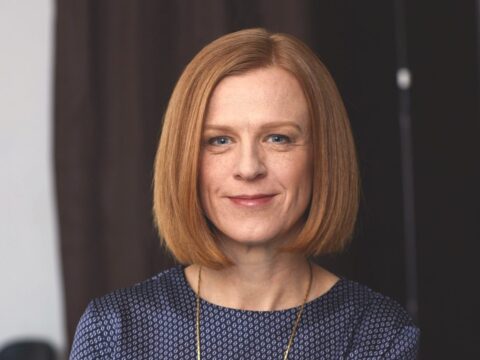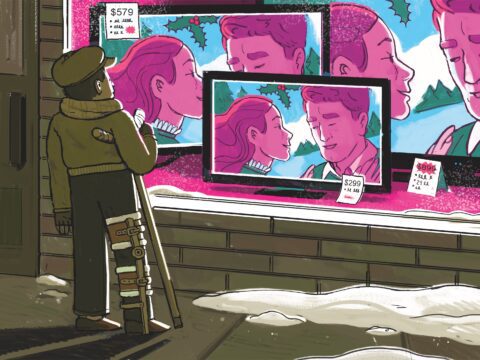From 1941 until the ’70s, the federal government forced Inuit to identify themselves by a number issued under the Eskimo Identification Canada system rather than their name. These numbers were printed on round tags or discs that were usually worn on necklaces. In Kinauvit?, her first non-fiction book, writer and scholar Norma Dunning — winner of a 2021 Governor General’s Literary Award for her short-story collection Tainna — brings to light the disc system’s impact on Inuit.
Dunning, an Inuk who was born in Quebec and raised in southern Canada, weaves research, interviews and her own story together to share this little-known piece of history and how it affected Inuit. She spoke with Alex Mlynek by phone from her home in Edmonton.
Why did the Canadian government create the disc system?
The big idea was to make things easier for the non-Inuit who were coming into the North as administrators. Over time, they began to realize that their records were not accurate due to variations in how each of them spelled an Inuit name. In their minds, all they had to do was to number Inuit, and that would eliminate having to deal with the spelling and pronunciation of a name.
Often, people will think of a system like this as, “Well, nobody lost their lives.” That there weren’t huge, visible ramifications because of being numbered. But what was lost or temporarily interrupted was the traditional Inuit system of naming and the ceremony around death. We see how colonization erodes a people, and it’s wrong. It’s very, very wrong.
How did this system interrupt the Inuit ceremony around death?
Inuit groupings might have six to 12 people who travelled together as a family. When one of the members would pass, the next child born would be given that member’s name. The thinking being, if the name is not transferred, then that person’s soul would just wander. And because the names were not gendered, if a great hunter passed away and he was a male, there wasn’t an expectation of having to wait for the next male to be born. Instead, if the next child born was a girl, then that girl would be trained to become a great hunter. There’s a transference not only of skill, but also of how that person was. The name would also represent the location where that family is from. So there was a much deeper and broader understanding of what was attached to an Inuit name.
When the administrators began issuing discs, Inuit were told, “You cannot lose this disc.” And eventually, the administrators said, “You have to use Christian biblical names.” And so the whole naming system began to disappear.
You write in the book about the distinctions between the disc system and other numbering systems, like social insurance numbers. Why is it important to you that readers understand the differences?
I lecture on the disc system, and a common question is, “Why is this such a big deal? We all have a social insurance number.” Well, Inuit carried a social insurance number plus a disc number, and we have to look at the amount of surveillance placed on Inuit populations in Canada through that number, because they had to use it when they were out buying goods, at school, at the doctor, in any kind of trapping they did and in selling those furs. A social insurance number doesn’t do that.
I hope the book helps non-Inuit understand the depth of that number and the impact it would have had on each Inuit life.
More on Broadview:
- Edmonton will soon get a permanent Indigenous ceremonial site
- Day school survivors need access to United Church archives
- ‘This House Is Not a Home’ tells a moving story of Indigenous dispossession
Some of your research involved speaking with Elders about the disc system. What did you learn from them?
One Elder treated it very satirically and would say, “You know, we just wore those necklaces for the government on the days we knew they were coming in.” This is coastal Inuit, and they would know that when the big ship is coming, somewhere on that ship are a bunch of government people. And often Inuit would think, “Ah, these poor people, they don’t understand our names. So this helps them.” They didn’t think about, “This harms me.”
It’s very common for Inuit not to think of yourself first, but to think of these people who need your help because apparently they can’t wrap their tongue around your language.
The federal government hasn’t apologized for the disc system. Is that something you would like them to do?
It’s not about blame, it’s not about wanting people to cry and it’s not about getting a payout of X amount of dollars. It’s about the acknowledgment of harm. That’s what I would like. I would like that acknowledgment and that accountability.
***
This interview has been edited and condensed for length and clarity. It first appeared in Broadview’s December 2022 issue with the title “It was very, very wrong.”
Alex Mlynek is a writer in Toronto.















Sad that the traditional way of naming has changed. Such a beautiful way to honour and remember your family.
Interesting that the interlopers chose the military way of recording people… the ‘dog tags’ that soldiers, sailors and airmen/women wear all use a numbering system. A more reliable way of identifying individuals, in areas of conflict where similar names could result in the wrong families receiving notification such as lost in action or death